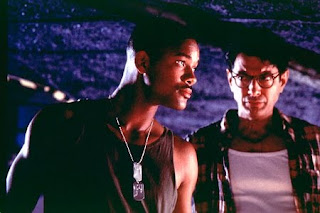
Pavarotti Killington
The Citizen
LOS ANGELES - As President Obama's approval rating continues to go down amidst stalled health care reform and a double digit unemployment rate, movie fans rallied in the hills this morning calling for a leader known for taking action - even if he is purely fictional.
Hundreds of fans of the 1996 blockbuster "Independence Day" gathered outside the home of actor Bill Pullman chanting "Today we celebrate our Independence Day" in hopes that the actor would storm Washington and oust the current regime immediately through a violent takeover or at least by 2012 through the democratic process.
"I've been out of the job for nine months now," Tom Browinsky, an unemployed welder and freqent movie goer said. President (Thomas) Whitmore is the right man for the job. In fact, he's been the right guy since '96 and I've been writing his name in the box ever since. For me the job of President is all about integrity and looking out for the regular folks like you and me. He could have laid down when those aliens were shooting that green junk everywhere but he didn't. He delivered the best speech in presidential history and even fired the first missile when their shields went down. People want a return to greatness and that's something out of George Washington's playbook, right there. He wasn't in a bunker hiding. He was there fighting for all of us."
Sandra O'Brien, an unemployed hairdresser, echoed Browinsky's view.
"Look, the guy lost his wife with his daughter at his side, and then saves the world all in a couple day's time. If he's not right for the job, then nobody is. President Whitmore has the experience and the gusto. He's even got military experience and even supported his wife Dottie during a time when many men wouldn't have, when she was catcher for the Peaches. I can't say it enough. He is the man America needs. A man of action and progression."
After twenty minutes of chanting, Pullman addressed the crowd from his front door in a bathrobe.
"I appreciate your support. I really do. But I'm not a politician. President Whitmore was a character I played 15 years ago. Please go home, please. I love that I have such great fans, but please. Remember, I'm Mr. Wrong. There's people out there, real politicians, who you need to get behind. They're Mr. Right."
However, the crowed remained while Pullman stayed indoors until a street brawl broke out between Pullman supporters and those of a Jeff Goldblum/Will Smith ticket.
"They came out of nowhere,
 " Earl Goodwin, a Pullman supporter said, as his forehead gushed blood. "We were just gathering peacefully and they go and do this. What is the world coming too?"
" Earl Goodwin, a Pullman supporter said, as his forehead gushed blood. "We were just gathering peacefully and they go and do this. What is the world coming too?"Dedrich David Smith, the spokesman for the Los Angeles Chapter of Get (Jeff) Goldblum and (Will) Smith Into the White House, said "Look I hate that people got hurt. We're not about that. Sometimes people lose their heads. We're just here to show that Mr. David Levinson and Capt. Steven Hiller are the true heroes and not that charlatan Whitmore. Levinson cracked the code knocking out the force field and is the reason Whitmore even got out of the White House before it blew up, and Hiller is the pilot that Whitmore wishes he could be. All Whitmore did was push a button. The truth is, if the greatest American hero, Mr. Russell Casse was still with us, he'd be the first President elected unanimously in history, and that's a fact."
Goldblum and Smith could not be reached for comment by press time.
The campaign manager for Kevin Kline's presidential bid, Cecil Forte, issued a short statement to the press in response to the outpouring for Pullman.
"Look, nobody can deny that President Whitmore did amazing things. He's the only president who ever had to respond to an alien invasion, and even I can't say that he could have handled it any better than he did. But the fact is, we're not under attack by aliens, right now. We'
 re under attack from unemployment, insurance companies, and a distrust in government. It won't take a scientist turned cable man and a future astronaut to solve these problems either. It'll take a man of Dave's stature. An everyman who got people jobs when there were no jobs to be had. A man who fought so he could see the triumphant look on the faces of those who had work. A man who cut government fat so the money could go to children who needed it. To me that's real action and it doesn't take being in a cockpit to do it. It just takes being there for the American people when they need you most."
re under attack from unemployment, insurance companies, and a distrust in government. It won't take a scientist turned cable man and a future astronaut to solve these problems either. It'll take a man of Dave's stature. An everyman who got people jobs when there were no jobs to be had. A man who fought so he could see the triumphant look on the faces of those who had work. A man who cut government fat so the money could go to children who needed it. To me that's real action and it doesn't take being in a cockpit to do it. It just takes being there for the American people when they need you most."After issuing the statement Forte refused to answer questions. Kline could not be reached for comment by press time.
Michael Douglas, Dennis Haysbert, Martin Sheen, John Travolta, Jack Nicholson and Chris Rock could also not be reached for comment by press time.









